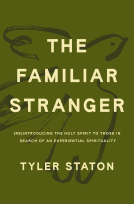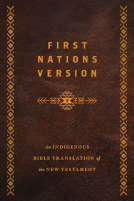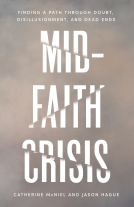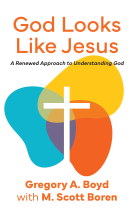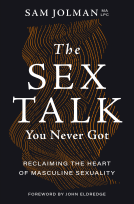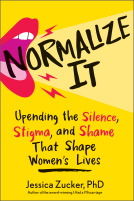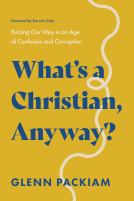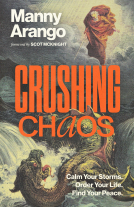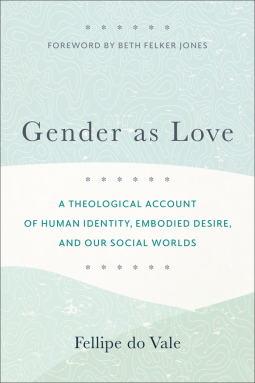
Gender as Love
A Theological Account of Human Identity, Embodied Desire, and Our Social Worlds
by Fellipe do Vale
This title was previously available on NetGalley and is now archived.
Send NetGalley books directly to your Kindle or Kindle app
1
To read on a Kindle or Kindle app, please add kindle@netgalley.com as an approved email address to receive files in your Amazon account. Click here for step-by-step instructions.
2
Also find your Kindle email address within your Amazon account, and enter it here.
Pub Date Nov 21 2023 | Archive Date Dec 31 2024
Baker Academic & Brazos Press | Baker Academic
Talking about this book? Use #GenderasLove #NetGalley. More hashtag tips!
Description
"A theologically sophisticated take on contentious contemporary debates about gender."--Christianity Today
In recent years, the issue of gender has become a topic of great importance and has generated discussion from the kitchen table to the academy. It is an issue that churches and Christian educational institutions are grappling with as well, since gender is a crucial aspect of identity, affecting how we engage socially and understand our embodiment. Upstream from all these conversations lies a more basic question: What is gender?
In Gender as Love, Fellipe do Vale takes a theological approach to understanding gender, employing both biblical exegesis and historical theology and emphasizing the role human love plays in shaping our identities. He engages with and explains current theories and debates, but his approach is unique in that it avoids the present impasse between social constructionist and biological essentialist paradigms. His emphasis is on love as identity forming.
This fresh, holistic approach makes an important contribution to the literature and will benefit scholars and students alike. Foreword by Beth Felker Jones.
Advance Praise
“A breath of fresh air that has the marks of a rush of the Spirit, do Vale’s work clears the confusion, fear, and acrimony that has clouded around the concept of gender. Gender as Love provides erudite guidance through the theory and, even more, rich exegetical and theological resources for living justly in response to God’s undeserved gifts, including the gift of gender. The joining of confidence in Christ with an epistemic humility that results in godly patience makes this author and this work a timely gift and a necessary read.”—Amy Peeler, Kenneth T. Wessner Chair of Biblical Studies, Wheaton College
“Everyone knows what topics to avoid at the dinner table: religion, politics, and—wait for it—gender (the new taboo topic now that sex is ‘safe’). Do Vale’s Gender as Love is not dinner conversation; it does not shirk the difficult questions but confronts them head on, with clear-sighted reasoning and openhearted compassion. Here is biblically grounded wisdom for male and female Christian disciples intent on using their sexed bodies in ways that foster love of God and neighbor. Here is the best kind of theology: direction the church desperately needs for such a time as this.”—Kevin J. Vanhoozer, research professor of systematic theology, Trinity Evangelical Divinity School
“Contemporary discussions of gender are often confusing and confused, lacking nuance, clarity, and consistency on some of the most fundamental terms. Answering John Webster’s call to engage in ‘theological theology,’ Fellipe do Vale adroitly clarifies how, precisely, we ought to conceive of gender from within the divine economy. Do Vale proposes, with a little help from Augustine of Hippo, that gender is a form of love directed toward various social goods in a manner that shapes the self. The result is, in a word, remarkable. This book is everything theology should aspire to be: elegant in its argumentation, accessible in its prose, brilliant in its content, and unreservedly devoted to the God of the gospel. It is a book that will remind you of why you first started writing and reading theology in the first place.”—Daniel Lee Hill, assistant professor of Christian theology, George W. Truett Theological Seminary
Available Editions
| EDITION | Other Format |
| ISBN | 9781540966971 |
| PRICE | $35.00 (USD) |
| PAGES | 272 |
Available on NetGalley
Featured Reviews
In this cultural moment, gender is one of those things that it seems we are not allowed to have thoughtful, quiet nuance on. There are two sides: you either believe in a highly prescriptive masculinity and femininity that reflects something essential about who you are, or you believe that gender is entirely a social construct that can thus be deconstructed, reconstructed, and remixed in endless ways. The essentialist view seems for some to be the only viable option for those who believe in the "givenness" and goodness of the material world, and yet others are able to highlight the many ways in which it results in excruciating oppression—so how could it be good? The social construction view has been embraced by many precisely because it seems so able to confront this oppression. Yet at the same time if gender is merely the construction of different social groups in their own cultural contexts and there is no stable ground underneath that, we forfeit any ability to morally confront the subjugation of, say, women or intersex/DSD individuals in other cultures or other times.
Fellipe do Vale believes that there is a better way forward than either of these options in the way that we think about and do gender. With his new work, Gender as Love, he makes the case that gender is something worthy of theological reflection, and that in fact theologians could offer a word that is clearer, more compassionate, and more just than any offerings available in the current conversation. His primary convictions are these:
1. Contra social constructionists of gender and especially sex, reality as it comes at us in our sexed bodies is stable beyond merely what we make of it; it is real and not merely a social matrix.
2. Contra gender essentialists, gender is more complicated than just a straight line derivation from reproductive biology or else it would always and at all times present in exactly the same way.
His example for the first conviction is that while his grandfather lived in 20th century Brazil and "observed standards of masculinity" to which do Vale doesn't hold, that the two of them are nevertheless the same kind of thing. Similarly, it is important for him to be able to tell his daughter that while they were of a different time and culture than her, "women such as Harriet Tubman and Sojourner Truth" are nevertheless similar to her in meaningful and important ways and that she could therefore aspire to be like them.
In regard to the second conviction, he says this:
If being a woman is identical with being an adult human female, then it does not matter for gender’s definition whether a woman shaves her legs, wears certain kinds of clothes, or performs any other kind of social activity. This, it seems to me, is a steep price to pay on account of the high import virtually all humans place on some kind of cultural activity for their genders. On this traditional view, therefore, culture is deflated and made irrelevant to gender.
He distills these convictions into four theses for "tenable theologies of gender":
1. Gender is an essence, though this is not reducible to or identical with biological determinism or biological essentialism.
2. The complexity of gender, the noetic effects of sin, and the current conditions of oppression complicate our epistemic access to gender’s essence. All the same, we can be assured that issues surrounding gender will be rectified in the eschaton.
3. Any theory or theology of gender must be consistent with and supportive of the cultivation of justice.
4. Gender is concerned with selves or identity and with the way selves organize social goods pertaining to their sexed bodies.
Much of the book, then, is given to explaining and defending these four theses. Ultimately, do Vale ends up with a view of gender as something that comes at us in our lived experience, and it is a complex mixture of biology and history and culture and ideology all at once that we don't even necessarily need to police in a theological way. He leverages 1 Corinthians 11 to say that "The interesting thing about a Christian theology of gender is that there is, in fact, nothing (or, at most, very few things) explicitly state in Scripture about what women and men must be like in context-independent ways or what the specific goods are by which a woman or a man must be identified." He unpacks that further to say that even where Scripture calls men and women specifically to act in certain ways, "they are often injunctions about how best to live as Christians within the culture in which they find themselves, a culture having already provided gendered goods for them to love. In their world, these are gendered goods; how should a Christian think about them?"
This isn't so much a gender agnosticism as much as an epistemic restraint: though we have moral grounds for the evaluation of some goods, we must be very careful not to say more than we actually have warrant to say. In contrast to Christian theologians who task themselves with recovering a purported biblical manhood and/or womanhood, that is, trying to say something ontological about who all men are or who all women are, do Vale's explicit aim is to move this conversation out of the world of ontology and into the world of ethics.
For some, I suspect that this will probably feel somewhat unsatisfying. Many, if not all of us, feel that existential ache to understand ourselves, and it would be quite lovely to have an exhaustively specific divine word outlining every corner of what our sexed and gendered existence must and must not be and how to make sense of the ways in which our bodies and minds and desires deviate from what seems to be the average experience. For do Vale, though, a project to find such a word is doomed from the start.
In many ways, I appreciate what he's trying to do. I come into this world, into 21st century American culture, as a male not having chosen what this culture deems to be acceptable norms for males, and finding that while some of them are true of me, others are not. I hate football, I'm vegetarian, and I'm not a gym beast. But on the other hand, I'm pretty handy with house projects, I do the work on my own car, and I have a mustache. I could go on. I didn't choose for any of these to be male stereotypes that I either align with or buck against. Some of them are ephemerally cultural (Working on cars being a "masculine" activity that Paul quite certainly did not engage in!) while others stem from my biological existence (e.g. my mustache).
I think that do Vale would encourage me to come at these gendered norms as a Christian not with heavy-handed pressuring to live up to every last one, nor with the indifference of "you do you" with regard to gender. Instead, I should come at them with a mind of moral evaluation. For example, the alpha masculinity of the alt right that trades on the objectification and subjugation of women is something that a Christian ought to reject because it is unjust and screechingly grinds against the ethic of gender as a way to love my neighbor.
I did find his overall posture of epistemic restraint to be sometimes wise and sometimes coming close to a cop out. His final word on the question of intersex/DSD individuals, for example, is more or less a shrug. He argues that "we are simply not in a position to know" what to make of such sexual ambiguity. That's better than blustering if one does not know, but it struck me as strange to bring up the issue and take so much time confronting the work of Defranza and Cornwall only to say that he doesn't have that much of an alternative other than "let's not make a world where they feel uncomfortable."
To the intense shame they may feel in a world in which they do not seem to fit, he proffers communities of grace where one's worth and dignity is not a function of living up to the community's stereotypes of a body's maleness or femaleness. This sounds nice, but it's unclear to me how this would materially be different than most churches' currently (stated) positions. Churches that adhere to traditionalist readings of gender, for example, would overwhelmingly "welcome" an ambiguously sexed individual into their congregation, but they would nevertheless most likely deny such an individual any meaningful participation in church leadership—thus reinforcing the felt shame of their existence and the challenge of believing in the God who created them. do Vale makes clear in the book that he does not see ordination as a gendered good and so this scenario wouldn't even arise for him, but the fact of the matter is that it would arise for thousands upon thousands of churches across the world, and it goes unaddressed in the present volume.
That being said, overall I found the work to be interesting, clear, and thought-provoking. I appreciated his epistemic restraint for the most part and his inclination to speak of gender in ethical rather than ontological ways. I'm on board with the call to morally evaluate gender as it exists before us and how we might live in it as Christians rather than to try to attempt some kind of "theological police" action. I would recommend the book to anyone who wonders how to bring moral-theological tools to bear on how to think about our gendered existence.
DISCLAIMER: I received a copy of this book from the publisher for the purpose of a fair, unbiased review.
 Reviewer 1281795
Reviewer 1281795
This was a thought provoking analysis of current notions of gender against the theological categories of Scripture. What I found fascinating was how it included a more nuanced take of Augustine's view of gender and love, which often is seen in a more negative light. Here Augustine's thought is engaged with more thoroughly and thoughtfully
 Conrade Y, Reviewer
Conrade Y, Reviewer
One of the biggest contentions today in the Church has to do with gender. In the past, there used to be constant debates about what it meant to be male or female, and what roles they were supposed to be playing. Then we have the feminist movement that pushes back against male dominance. Those issues remain active in many parts of society but are increasingly eclipsed by debates surrounding multi-gendered definitions and nuanced multi-dimensionally. Today, the line between male and female is increasingly blurred. The core issue is not sexuality but what it means to be human. Realizing that gender issues are becoming more divisive each day, we need to have a way to talk about these matters rationally and theologically. Thus, this book probes the biblical understanding of gender sexuality and tries to make sense of it in an increasingly complex social construct today. Simply put, it is to shed light on the question: "What is gender?" and How do we understand gender theologically? With so many different theological interpretations today, how do we do "theological theology?" Author-Professor Fellipe do Vale kicks off by laying out the categories in terms of two "bifurcations":
1) Divisive Philosophy: Between proponents of gender as "Essence" vs that as "Social Construct."
2) Divided Theology (Methodological): One anchored on modern academic discipline and the other on traditional beliefs.
He spends some time unpacking "theological theology" as a way to do theology well. He distinguishes it from other disciplines by saying that it is both biblical reasoning and also God-centered thinking. From this central thesis, one can then proceed onward with interpretations of all other narratives, and in this case, anthropology and gender matters. He presents four theses for our consideration.
Chapter Two lays out the most prominent view of gender as "a social construct." Chapter Three covers broadly the rest of the views via the four theses:
1) Gender is an essence
2) A full understanding of gender will be revealed in the eschaton
3) Any theory/theology of gender must be in line with the cultivation of justice
4) Gender and identity go hand in hand.
Chapter Four deals with the fourth thesis. Chapter Five is a conversation with Sarah's Coakley's asertion that gender and desire are intimately linked. Chapters Six and Seven look at gender via the theological narratives of creation, fall, redemption, and consummation. The concluding chapter of the book lays out the author's position on the question of gender. After acknowledging the various angles of interpretation, he proposes a unifying position that we all understand gender as love. We all need to learn the "task of loving rightly."
My Thoughts
==============
The Bible has said that God created humans as either male or female. As time goes by, many have not only challenged the binary definitions of created beings but introduced multidimensional views on gender. Some countries have even introduced Gender X to allow individuals for whatever reasons not to choose either male or female as their gender. In the name of inclusivity, Canada has even introduced terms like 2SLGBTQIA+ as an umbrella term for a third gender category. Is there a way to challenge any of these positions without being branded judgmental or labeled a bigot? Fellipe do Vale shows us a way to do just that, to focus on points of view instead of persons of whatever gender persuasions.
This book is an academic treatment of gender and sexuality. Knowing full well the controversies surrounding the question of gender, he urges us to return to the true nature of theology: To see God and God's purposes for creation. We should not let modern social constructs manipulate our theology. Rather, we should adopt the position of engaging with love especially when we deal with contentious matters at hand. Learn to recognize the pain experienced by the marginalized. Our identity is less about desire and more about love. We should let our theologizing be based on Scripture and not let human emotions dictate our positions. I appreciate the care the author takes to explain what "social construction of gender" means. Many contemporary academics and theologians seem to be taking this "social construct" as the "right" way to interpret gender, that is, preferring "gender-neutral" instead of "gender-specific" positions. The most common reason is to push back against "oppressive social structures," referring usually to those who take the "gender-specific" position.
I must commend the author for his nuanced understanding of "social constructs" and his careful reasoning about his own stand. One needs to read his work carefully in order to avoid jumping to conclusions about his conclusion. A key point is how he qualifies his arguments to show that he is in neither the "social construct" camp nor the "gender as essence" camp. He proposes that we recognize this diversity of views to welcome all to the table of conversation. In summary, this book is about a conversation over arguments, and not judgment statements per se. In that light, we should not see this book as some ammunition for any one particular position. His compromise is to simply conclude with the term "gendered pilgrims," which I feel in itself is already a form of label influenced by the very social construct he is arguing about.
That said, this is not an easy book to read. In fact, it might be quickly misunderstood without careful reading. His four theses cover a wide range of views surrounding gender today. Basically, our identities should transcend our various views of gender. This is exactly what the author encourages us to do. Chapter 5 is a key chapter to understand his proposal.
Fellipe do Vale (PhD, Southern Methodist University) is assistant professor of biblical and systematic theology at Trinity Evangelical Divinity School in Deerfield, Illinois. He specializes in the juncture where theological anthropology and moral theology meet and has published widely on gender, ethics, and systematic theology. He lives in the Chicago area with his family.
Rating: 4 stars out of 5.
conrade
This book has been provided courtesy of Baker Academic via NetGalley without requiring a positive review. All opinions offered above are mine unless otherwise stated or implied.
 Cynthia M, Reviewer
Cynthia M, Reviewer
Fellipe do Vale's work is incredible. His approach is theologically profound, humble and generous, especially when dealing with such a delicate and complex subject. He presents important biblical insights. I would highlight the chapter where he presents a very interesting analysis of Augustine of Hippo in connection with the topic. ema.
Readers who liked this book also liked:
Terry M. Wildman
Christian, OwnVoices, Religion & Spirituality
Sostenes B. Lima, LCSW; Erica Lima, LCSW
Health, Mind & Body, Self-Help


